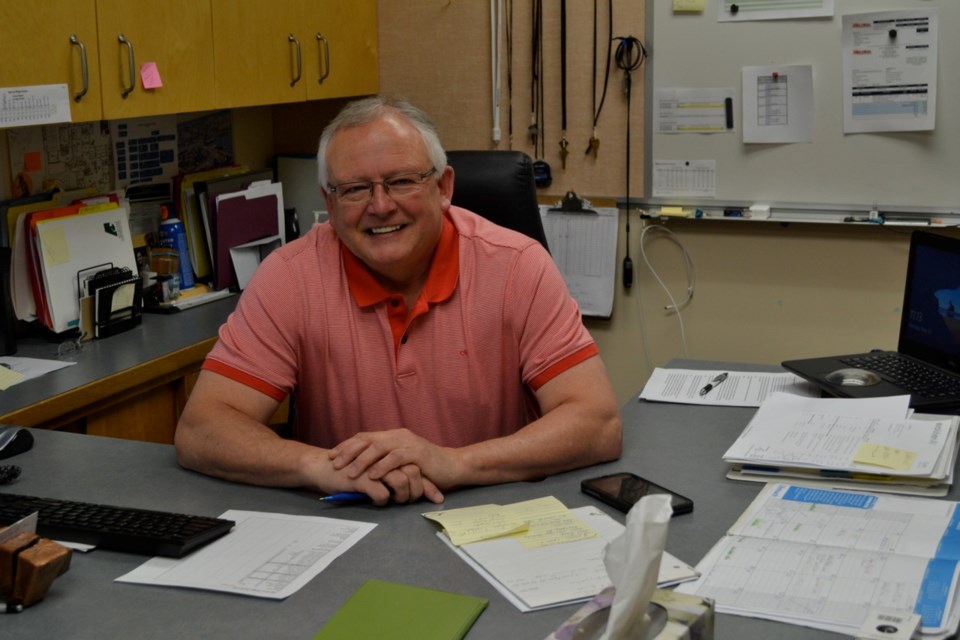Doug Stallard came to southeast Saskatchewan in 1982, expecting that he would be here for a couple of years, and then he would move on.
He was from northern Saskatchewan, and was used to the rough terrain with rocks, rivers, lakes and trees. The flat terrain and the wind didn’t appeal to him at first.
“But you get involved with the people, you enjoy the people you work with and you make things go. You can always go back home to visit. This became my home quickly, mainly because of the community, the people in it and the activities I got involved with,” Stallard said in an interview with the Mercury.
The long-time educator, who is the principal of Spruce Ridge School, is now ready to move on, but obviously he spent a lot more than two years down here.
Stallard announced earlier this year he is retiring at the end of the 2019-20 school year, giving him the chance to get out and enjoy his retirement while he still can.
“I don’t want to be one of those teachers to go to the very end and then end up not being able to get out and see parts of the world. I want to use up some years while I still have the years left,” he said.
After he came to the southeast, Stallard spent two years teaching Grade 5 students. His next stop was Westview School in Estevan for two years, and then he spent 17 years at the Estevan Junior High. Stallard had one year as the principal at the junior high – its final year of 2002-03.
He always enjoyed teaching at the school.
“I liked that age group. There was always something that was going to happen with that age group. I dealt with most of the interesting things that administrators can at that age group.
When it closed, Stallard shifted to Spruce Ridge, serving as vice-principal until 2016, when he became principal.
“My whole career has mainly been VP. That’s the position I like because you got to be with the students a lot more, and you got a little bit of the run of the business as well. I had been offered principalships in other schools, but I liked the VP.”
He believes that he has learned as much from the teachers and students as they have from him. Since he has never stopped learning, it makes it easier to teach.
Stallard says he will miss the teachers and students he has worked with.
“The number of personalities that I meet with teachers is fantastic. You meet a range of youths. The students, they’re always a blast. You always look at the varied personalities that you deal with. My motto has always been that if I can’t leave smiling at the end of the day, and smiling coming into the building the next morning, then maybe it is time to look at a different career.”
Technology easily represents the biggest change that he has witnessed. He remembers the old cranking duplicator, the old-fashioned computers, the photocopiers and other devices now obsolete.
“It’s like if you ask a retired farmer who worked with horses as compared to work with tractors nowadays, that’s what it’s like,” said Stallard.
When he first started teaching, it was a big deal to have a hand-held calculator. Students have taught him a lot when it comes to technology.
He considers himself fortunate to have dealt with a lot of good and supportive directors and administrators in his time, to go along with the students and staff.
“It’s been a good career. If I could do it again, I probably would do it … over again. Probably better, though.”
The past couple of months, with the suspension of in-classroom activities in late March, aren’t how he envisioned the end of his career. Stallard has seen it all, including some very tough times, but the pandemic is something new.
If he can be involved with the process of bringing students back following the pandemic, he would welcome that opportunity.
“It’s hard to not say good-bye to the students and teachers the way you’d like to, it’s going to be hard, but you have to move on.”
He has a son overseas he wants to spend more time with, and a daughter in Flin Flon that he looks forward to seeing more often. He’ll be in Estevan for at least a couple of more years, and he anticipates he’ll work as a substitute teacher during that time in what he calls “the weaning process.”
“I’ve been in it for that many years. I don’t think I could just jump out with being not in contact with students,” said Stallard.




